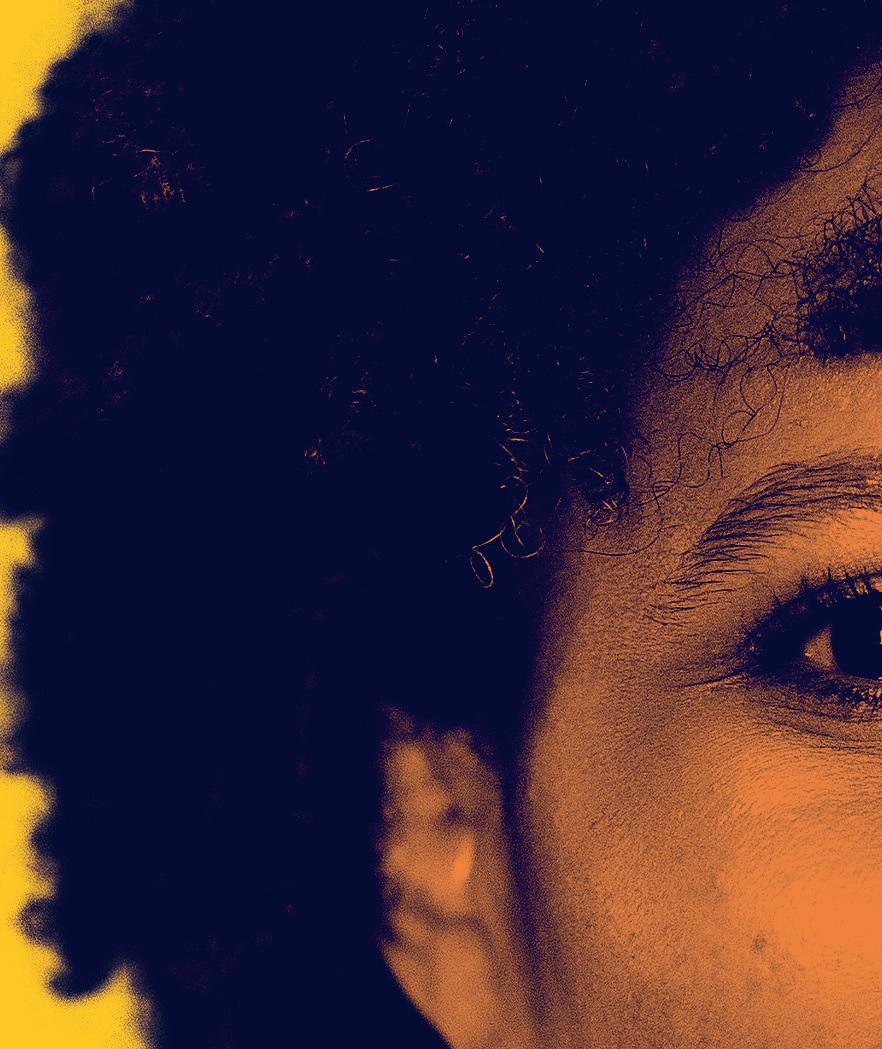
11 minute read
Stacey Mac Donald


Advertisement






In fourth grade, I told my mother I was going to study at a friend’s house. But instead, I secretly took a 45-minute bus ride to the big city. I, a small kid in a school uniform and a ponytail, spent my afternoon wandering around the bustling, noisy streets, full of pedestrians rushing to somewhere that seemed extremely important, crossing and dancing around each other’s paths. There were mixed sounds of conversations, laughter, and arguments, and the scent of the salty ocean mixed with car exhaust, perfumes, and body odours. I was hooked and kept sneaking out whenever I could. Only one bus ride away from me, a world bursting with mysteries to be explored.
Smart Cities Cities will always represent for me a ‘sum that is bigger than its part’, more than geographic and architectural landscapes that one can chart and visit, an intricate tapestry of histories, communities, and stories. Cities are formed and can only be truly experienced by unmediated shared and intimate experiences, attitudes, and etiquettes. Such qualities can only be comprehended by unmediated engagement.

With the incredible real-time computational and spatial technological abilities we hone today, urban environments quickly become a perfect petri dish for identifying, targeting, and implementing mass behaviours and trends. An ideal condition to champion the integration of digitally-infused urban systems to create Smart Cities, berating the innovation value that large-scale data analysis can produce such as its contribution to deploy eff ective policies and effi ciently respond to citizens’ needs.
This approach might be wellintentioned but echoes a narrow perspective of technological means as the core (and only) path for progress. Some automation paths can lead to experiential hell. Think about outsourcing customer service to automated bot systems and virtual assistants. Service bots might be generally effi cient, but they force users to communicate with algorithms that fail to provide a real sense of interpersonal attention or off er solutions for unique problems. At times, such mechanisms are deliberately designed to deter users from receiving hands-on assistance, such as discouraging users from terminating a service agreement or subscription. Imagine such ‘joy’ integrated into a city-wide environment.
Smart Cities propagate effi ciency, digital coherency, and information © Froukje Vernooij
Responsibility, Participation, and Injustice
Thoughts on the conundrum of climate justice in the Dutch Caribbean
Stacey Mac Donald Interdisciplinary social scientist & sustainability consultant
The participatory process is complex in any context, let alone a geopolitical, post-colonial and intercontinental one. Stacy Mac Donald describes the confl icts of interest and mixed messaging she encounters during her work with local fi sheries on the island of Bonaire. How should we divide responsibility in search for solutions?
During the DCFA session on Climate and the Kingdom, the admirable panellists debated the question: ‘How can we create a Kingdom in which (environmental) justice is at the fore?’ I was very triggered. A consensus arrived among the panellists during the debate on the issue of environmental justice and responsibility. Namely, the Dutch National Government should take on much more (perhaps all) responsibility for the consequences of climate change in the Dutch Caribbean.
I also saw this narrative more recently during a roundtable session organised on Bonaire by Greenpeace, called The forgotten municipality. The topics discussed that evening were climate change and human rights on Bonaire. As the title of the evening hinted towards, the discussion significantly centred around the negligence of the Netherlands when it comes to taking climate action on Bonaire.
Working in the field of nature management on the islands for some years now, I notice that my views on responsibility and ownership have become more nuanced. I acknowledge that the Dutch Caribbean islands are unjustly affected by the consequences of climate change. However, I do not believe this is a reason to dismiss the responsibility of local governments. Moreover, suppose full responsibility lies with the Dutch government. In that case, I strongly doubt whether proper action would be taken and, more importantly, if this responsibility and its actions would be accepted and adhered to on the islands.
Allow me to elaborate on this apparent paradox I have observed during my work and research in the past years. The Dutch Caribbean paradox There is an ongoing debate on who is responsible for climate change mitigation action in the Dutch Caribbean. This debate centres around ownership and action, but mostly focuses on responsibility. Many blame the National Dutch Government, stating they should take responsibility and action. At the same time, resistance against interference of the Netherlands on the islands is growing. The island governments and the island community regret the Netherlands’ power and control over the islands. The three special municipalities – Bonaire, St. Eustatius and Saba – currently experience a strong sentiment of recolonisation.
So here is the paradox: the Netherlands should take responsibility, but is not to take over. The islands want ownership and control, but also claim they don’t have enough capacity – neither in financial means and human resources, nor, at times, in knowledge. Where, then, should the breadth and vigour to prepare for the consequences of climate change come from? I’ve also seen this in ‘smaller’ debates on the island, for example during my work with the fishing community on Bonaire. The island has a longstanding fishery culture and community. Like so many socio-ecological activities, Bonaire’s fishery sector is currently dealing with pressures from many corners, including those brought about by climate change. The changing climate, economy and availability of resources required the island to address the management of the sector and the livelihoods that depend on it. In the past, fishery management (if management took place) primarily took a topdown, eco-centred approach on Bonaire, meaning: implementing legal protection of endangered and/or ecologically important species.
Unsurprisingly, this approach did not lead to effective management. Rather, it created resistance among the fishing community and beyond to adhere to many of the measures that were put into place. It was argued this disagreement could be resolved by creating a management system that allowed for fisher participation during the full process. As the fishers repeatedly stated: “We must have a say in what is happening, too!”
Participation as ‘the’ solution? Throughout the DCFA evening, the panellists kept referring to the importance of participation. No, the Dutch are not supposed to take over; we locals should have a say, be included, and actively participate in the decisions on climate resilience on the islands. However, achieving an arena of active participation where voices are heard is a complex and time-consuming process, with no hard guarantee to effective and informed decision-making and as one may hope.
This complexity is becoming particularly clear to me throughout my work with the fishing community of Bonaire. While participation was and still is deemed important by the fishing community, simply offering a seat at the table is not enough. Guidance and, most importantly, willingness from all parties to understand each other remains essential. And even then, participation does not automatically mean or lead to agreement or cooperation; a false assumption held by many.
Thoughts on participation and equality I’ve noticed that, after several years, the fishing cooperative on Bonaire is acknowledged and seen as a key stakeholder in management procedures. They have a seat at a table. They are included in management procedures and policy development and are provided with financial means to facilitate their participation. However, when it is time to discuss actions, fishers sometimes still reject their seat. Instead of participating, they choose to be absent, which leads to delay, falling back on traditional top-down processes, or lack of action altogether.
During these moments, fishers argue there is an unequal relationship between themselves and other organisations and institutions, including the government. They demand for procedures and decisions to be skewed to ‘their favour’. They also demand a way of working that they can keep up with, while remaining in control. I must admit, I am struggling putting these thoughts concisely on paper, as there is still much room for debate on what are fair, favourable, just, and even effective measures to take to ensure the fishery sector is both ecologically and socio-economically secured.
Nevertheless, these dynamics illustrate the complexity of the process of participation. It is a constant struggle to find a
balance between procedures, actions, consequences, and investments. What I have learned is that when we want to be successful at participative decision making, we should also be very mindful of the demand of tailoring and deconstructing the current bureaucratic procedures. Contrary to common belief, this means that to ensure equality in procedures, we must acknowledge that while we should adhere to a set of basic principles that apply to all, the practicality of execution should leave ample room for tailored processes. And to figure this out, we need time and understanding. Back to responsibility: about the how, and we need it now The climate has changed, the consequences are here, and action is required immediately. So how to solve this paradox? How long should this debate take place? When contemplating responsibility, it is helpful to think about what this means. I think we can agree that acknowledgement alone is not enough.
Acknowledgment through active participation and cooperation with and adherence to plans when they are being developed and implemented is a step forward. However, I can’t help but conclude that even this is often experienced as a challenge by many of us.
Nevertheless, it keeps coming down to ‘the method’. I’ve seen this during my work with the fishing community and am seeing this in other settings today. For example, generally speaking environmental NGOs have a culture of people
being highly opinionated about how an organisation is supposed to do their work and invest their money and expertise. While a dose of healthy critique is never harmful, these loudly voiced opinions are often based on partial information and false expectations that dismiss the realities of the respective organisations. And this critique becomes harmful when they inhibit collaboration among nature organisations and environmentalists, governments and even communities as a whole.
Investing in working relationships that foster active participation requires time, especially considering the historical bond between the Netherlands, the Caribbean islands and the Dutch Kingdom. This relationship is tainted with distrust and requires clear communication, transparency, and mutual understanding. It means both parties must understand, be held accountable, and hold up to their part of the agreements. It requires fostering joint responsibility, and most of all, it requires time.
And this is where the paradox meets – while I believe everyone agrees rebuilding and gaining trust takes time, we also know that time is what we lack. The consequences of climate change are here and now. I must admit, it is hard to not be critical and perhaps even a bit cynical when contemplating this dilemma. And as I’m writing this, I’m sitting at one of my favourite beaches on Bonaire. While I’m soothing my cynicism by enjoying the nice breeze, sunshine, and reassuring chirping of some birds, I can’t help but think how different this Sunday could’ve been if the predicted tropical storm Bonnie would’ve struck last week. Once again, Bonaire (and Curaçao and Aruba) got lucky. It was a close call, though, and all the islands seemed to be in uproar. Never in my 32 years have I seen such a diligent response towards a possible storm from the islands. I must admit that I cannot ignore the hopeful thought: has the time come at which the governments on both sides of the ocean are ready to take responsibility when the unavoidable hits? Perhaps the required change, trust, responsibility, and active participation will come once the moment to debate has passed and our only option for survival is to act. Perhaps climate change will provide the opportunity for the Dutch Kingdom to be one. Perhaps, despite my wariness and cynicism, and if I do my best to forget some of the things that happened after Hurricane Irma in 2017 – I cannot help but to remain hopeful.
The question remains then, what is the optimal way to establish a form of collaboration that fosters the required sense of responsibility and capacity to tackle big issues like climate change, both locally and globally? I have not come across a best practice yet, but I believe it starts with open communication and am evermore determined to create it myself.
Will you join me?
CURIOUS FOR MORE?
The speakers in the DCFA programme Crafting a Shared Future contemplate how, in the wake of a colonial past and present, we can facilitate collective healing and reshape the future.
BOOK: RAINFOREST WARRIORS
A historical, ethnographic, and documentary account of a people, their threatened rainforest, and their successful attempt to harness international human rights law in the fi ght to protect their way of life.
BOOK: A BIGGER PICTURE
Vanessa Nakate discusses how the world’s biggest polluters are asleep at the wheel, ignoring the Global South where the eff ects of climate injustice are most fi ercely felt.










